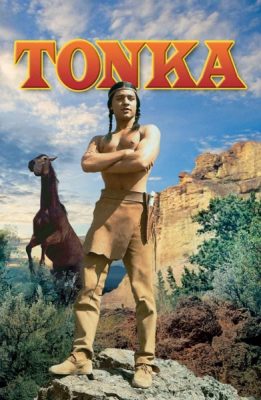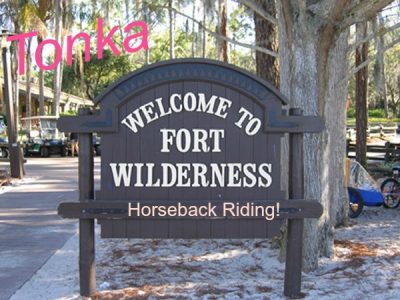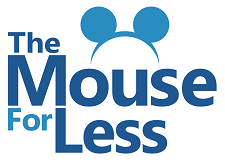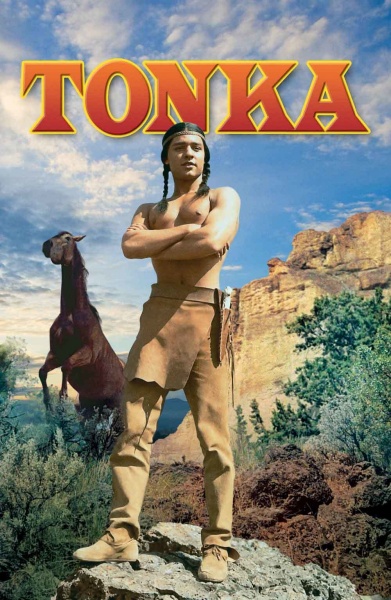
Based on David Appel’s 1951 novel Comanche: Story of America’s Most Heroic Horse and loosely on the events surrounding the 1876 Battle of the Little Bighorn, Disney’s Tonka was theatrically released on Christmas Day 1958. The live action drama is ninety-seven minutes in length.
Plot Summary
In 1876 Montana Territory, a teenage Sioux named White Bull (Sal Mineo) is punished after losing the prized rope of the arrogant warrior Yellow Bull (H.M. Wynant) while unsuccessfully trying to capture a beautiful wild horse during a hunting expedition. White Bull hates Yellow Bull, yet their troubled subordinate-superior relationship affords White Bull perspective when he indeed captures the horse, which he names “Tonka Wakon” or “the great one.” To this end, though White Bull claimed Tonka through his own efforts, Yellow Bull successfully asserts his tribal rank as justification for taking Tonka from White Bull and begins to berate and batter the horse. Horrified and repentant over the fact that his initial capture of the horse set the stage for Yellow Bull’s claim, White Bull frees the steed such that Tonka can live apart from Yellow Bull’s cruel ways. Unfortunately for White Bull, Tonka is soon recaptured by the United States army, so the horse is now under enemy jurisdiction. Can White Bull and Tonka toe the line between the Native American and white worlds and remain friends even in the shadow of the Battle of the Little Bighorn?
Tonka’s story is generally interesting and oftentimes heartwarming, though the extended scenes early in the film where White Bull interacts in solitude with Tonka are on the boring side.
Custer’s Last Stand
The Battle of the Little Bighorn, popularly known as “Custer’s Last Stand,” was fought between United States troops and combined forces of Lakota, Northern Cheyenne, and Arapaho Indians on the Little Bighorn River in the Montana Territory on June 25 and 26, 1876. Hoping to wipe out their Indian opponents, who had either refused to move to reservations in South Dakota or had abandoned said reservations after the discovery of gold in the South Dakota Black Hills brought an influx of white settlers to the region contrary to treaty regulations, United States forces under the command of Lieutenant Colonel George Armstrong Custer (portrayed by Britt Lomond in Tonka) instead suffered a devasting defeat. When all was said and done, Custer and more than two-hundred United States soldiers, including Captain Myles Keogh (portrayed by Philip Carey in Tonka), lay dead on the plains.
Although the Indians, under the leadership of Sitting Bull (portrayed by John War Eagle in Tonka), prevailed at Little Bighorn, the victory proved a mixed blessing for the Native Americans, for Custer’s demise encouraged the United States government to deploy more troops to the region—these forces would eventually subdue the Native Americans. (1)
Parker’s Last Stand
Fess Parker, who was named a Disney Legend in 1991, could have channeled his inner Myles Keogh and made his “last stand” for Disney at the Battle of the Little Bighorn in Tonka. As events transpired, however, Parker’s last stand for the studio came 112 years prior to Little Bighorn in 1764 Pennsylvania in another 1958 film, The Light in the Forest. Parker, who was slated by Disney to portray Keogh in Tonka, had become angry with Disney on two fronts. First, he deemed his roles with the studio after the Davy Crockett craze disappointing—in The Great Locomotive Chase (1956), for example, Parker felt that he was unintentionally cast into the villain’s role; in Old Yeller (1957), he appears only briefly at the beginning and the end of the film; and in The Light in the Forest, his character, Del Hardy, was overshadowed by the character, Johnny Butler, portrayed by the young James MacArthur, a situation Parker correctly saw destined to happen again in Tonka in relation to Sal Mineo’s character. Secondly, Parker was disgruntled with Walt Disney’s refusal to loan the actor to other studios to appear in various films, most notably The Searchers (1956). As such, Parker refused to appear in Tonka and was suspended by Disney, never to appear in another film for the studio. (2)
Respect
Though they are on opposite sides of the Battle of the Little Bighorn, respect for the fate of Tonka, or “Comanche” as he is called by the white soldiers, connects White Bull and Keogh, both men condemning counterparts on their own side of the fight for cruelty towards the steed. As depicted in The Light in the Forest, good and bad men exist on both sides of the aisle.
Action and Music
Much of Tonka’s excitement comes in numerous horse-riding segments, the intensity of which is augmented by instrumental reprisals of the film’s dramatic theme song, “Tonka,” which is performed lyrically at both the beginning and the end of the movie.
Humor
Tonka is not a comedy and has no moments that are worth more than a chuckle. The acting is also competent, so you will likely not find yourself laughing at awkward performances.
Relationship to Other Disney Films
Native Americans were also prominently featured in Davy Crockett, King of the Wild Frontier (1955), Davy Crockett and the River Pirates (1956), Westward Ho, the Wagons! (1956), The Light in the Forest, Savage Sam (1963), Those Calloways (1965), Treasure of Matecumbe (1976), The Apple Dumpling Gang Rides Again (1979), and Pocahontas (1995).
Tonka, like Johnny Butler in The Light in the Forest, serves as a conduit between the respective worlds of the Native Americans and the white man.
Horses were also prominently featured in The Littlest Outlaw (1955), Miracle of the White Stallions (1963), The Horse in the Gray Flannel Suit (1968), Ride a Wild Pony (1975), The Young Black Stallion (2003), and Secretariat (2010).
Real events in United States history were also portrayed in Davy Crockett, King of the Wild Frontier, The Great Locomotive Chase, Westward Ho, the Wagons!, Johnny Tremain (1957), The Light in the Forest, and Pocahontas.
Rafael Campos, who appears in Tonka as White Bull’s friend Strong Bear, had previously appeared in The Light in the Forest for Disney.
Slim Pickens, who appears in Tonka as one of the ranchers who sell Tonka to the United States army after his release by White Bull, had previously appeared in The Great Locomotive Chase for Disney, and he subsequently contributed to Savage Sam, Never a Dull Moment (1968), and The Apple Dumpling Gang (1975) for the studio.
In the Parks
Horseback riding is among the recreational activities available at the “Tri-Circle-D Ranch” at Walt Disney World’s Fort Wilderness Resort and Campground.

The United States frontier is represented in the respective “Frontierland” sections of Walt Disney World’s Magic Kingdom, Disneyland Park, and Disneyland Park Paris; the “Westernland” section of Tokyo Disneyland Park; and the “Grizzly Gulch” section of Hong Kong Disneyland Park.
Overall
Tonka’s plot is somewhat unevenly paced, but a solid soundtrack, frequent action sequences, and some heartwarming moments make the film a generally enjoyable ride.
Notes
1) “Battle of the Little Bighorn,” National Park Service: Little Bighorn Battlefield, https://www.nps.gov/libi/learn/historyculture/battle-of-the-little-bighorn.htm; “Battle of the Little Bighorn,” https://www.history.com/topics/native-american-history/battle-of-the-little-bighorn.
2) Fess Parker, “Fess Parker: An Interview by Michael Barrier,” interview by Michael Barrier, Michael Barrier.com: Exploring the World of Animated Films and Comic Art, December 20, 2004, accessed August 23, 2018, http://www.michaelbarrier.com/Interviews/Parker/interview_fess_parker.
What do you think of Tonka? Let me know in the comments!
Sponsored Ad: Would you like to help support The Mouse For Less website in continuing their mission of being THE Disney vacation planning resource? You can do so by purchasing Tonka from our Affiliate Link through Amazon. Thanks so much for your support!
Did you like this article? Make sure to share it with your friends! Check below for easy ways to share!
Want to visit a Disney destination? Contact The Magic for Less Travel for more information and a free, no-obligation quote.
Incoming search terms:
- https://www themouseforless com/blog_world/movie-review-tonka/
- Disney movie about general clusters horse


